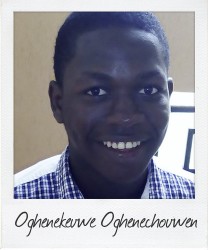“We could empathise with our lecturers”
October 4th, 2017 A strike by university lecturers is an opportunity, writes Oghenekevwe Oghenechovwen, 18, a Commonwealth Correspondent from Warri in Nigeria, who urges students to use events to demonstrate empathy and initiative.
A strike by university lecturers is an opportunity, writes Oghenekevwe Oghenechovwen, 18, a Commonwealth Correspondent from Warri in Nigeria, who urges students to use events to demonstrate empathy and initiative.
As societies evolve and shared challenges become more complex, universities – the world’s oldest capacity-building institutions – must provide road maps and solutions.
On August 13th this year, a critical chunk of the Nigerian university education system was indefinitely stalled by the Academic Staff Union of Universities (ASUU). If you think this academic shutdown is another looming risk to the country’s development and ambitions, you are right.
Africanist and thinker, Pius Adesanmi, believes the troubles of university education in Nigeria has a connection with the skewed value system of Nigeria’s contemporary political leaders. He recently commented on Facebook, “In such a depressing national context, education has lost its principal recommendation to the youth as the pathway to worth, value, and upward mobility in society.” Professor Pius Adesanmi is Director of the stand-alone Institute of African Studies in Carleton University.
Numerous stressful situations of this sort have occurred in the past, with the earliest industrial action by ASUU happening in 1980 during Nigeria’s Second Republic. Prior to this current indefinite strike action, the Union had to embark on a one-week strike in November 2016. ASUU also embarked on a six-month strike between July and November 2013. Though each industrial action by ASUU is unique, most reasons for them are themed: shortfall in salary payment, non-implementation of previous agreements, and insufficient government funding of universities. But I digress.
As I do not study at a privately-owned university, I am affected by the strike and so am out of campus now. Rather than share how this painfully disrupts my career plan and that of my friends, explain the threats to national development, or even blame ASUU and concerned stakeholders, I will stress on a paradoxical meme that was perpetuated by some young Nigerians and organizations, especially on social media, at the onset of the nationwide strike.
Whilst this meme or idea is not entirely new, it is profound nowadays. And it is somewhat linked to something nice. The idea tells thousands of affected undergraduates to see the ASUU strike as “nothing but an opportunity.” Through online posts, teeming undergraduates are strongly advised not to sit at home, when instead they can make best of the forced vacation – as usual. Therefore, the idea sees some of these students matched with part-time opportunities and internships suddenly opened up by companies. There is a problem with this, and that problem is individualism and apathy.
Except from members of the news media, with all this show of effort and seeming care for students, there was little empathy for lecturers and unwillingness to understand their existing conditions, why ASUU struck, and their demands to the federal government. This posture is unhealthy, as it not only ignores the interdependencies of students and their teachers’ well-being in learning and social development, but also informs us of a quiet culture that might be socialising young people into becoming more individualistic rather than empathetic.
One of the pro-social posts I read on Medium concluded with a note, “If you remain the same at the end of this ASUU strike, you’re the brain behind your own calamities.” This was after the story told my friends and me to be autodidactic and own our future, and then listed out resources for the owning process. By implication, and in an unpleasant way, the story also says lecturers and ASUU are now unnoticeable factors within realities of the education framework in Nigeria.
“Umuntu ngumuntu ngabantu: A person is a person because of other people.” This deep Zulu proverb expresses the meaning of “humanity” in the traditional African context and the empathy I am emphasising for lecturers. This empathy is about being open-minded and courteously probing on the value of lecturers, what ASUU is doing or trying to achieve. Also, it is about being willing to ask the big questions, and share in, the issues negotiated by FG and ASUU – without ridicule and judgment at face value.
This is a possible but hard line to make for Nigerian youths. And it has the effect of sinking individualistic traits – taking what happens to us as exceptionally personal before sharing in others’ suffering and perspective – and placing significant demands on us to portray the highest virtues of sharing and connection that African society strives for.
Twitter: @c_chovwen
Photo credit: aaronrhawkins Stepping Into the Future via photopin (license)
…………………………………………………………………………………………………………………
About me: I am a third-year Meteorology and Climate Science undergraduate at the Federal University of Technology Akure. I have a growing interest in governance and digital opportunities related to water, environment, and health challenges. I enjoy playing board games. Connect with me via email: chrischovwen@gmail.com
…………………………………………………………………………………………………………………
Opinions expressed in this article are those of the author and do not necessarily represent the views of the Commonwealth Youth Programme. Articles are published in a spirit of dialogue, respect and understanding. If you disagree, why not submit a response?
To learn more about becoming a Commonwealth Correspondent please visit: http://www.yourcommonwealth.org/submit-articles/
…………………………………………………………………………………………………………………




